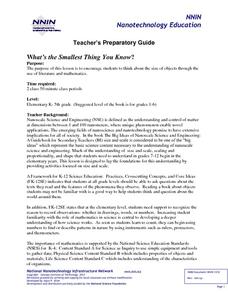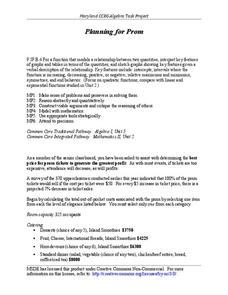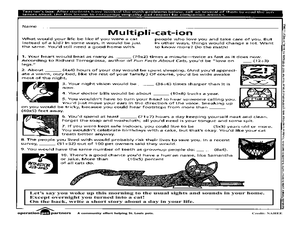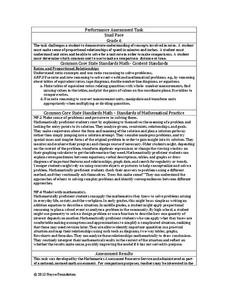Curated OER
Adolescent Sleep
Students discuss, summarize, and express alternative positions regarding a study on adolescent sleep. They examine arguments for and against changing the school start time for high-school students, based upon the findings of a scientific...
Curated OER
Science NetLinks: Adolescent Sleep
Wake up, sleepy head! High schoolers craft a creative presentation that represents how they feel when they wake up on a school morning. After the presentations, a reading of Academic Sleep Times and Academic Performance launches a...
Council for the Curriculum, Examinations and Assessment
Drugs Awareness
Legal and illegal. Use and misuse. Risks and consequences. Myths and facts. Class members investigate the effects on the body of various drugs, including cannabis, nicotine, and alcohol.
Computer Science Unplugged
Battleships—Searching Algorithms
How does a computer perform a search in order to find data? The lesson begins with a demonstration on finding one number out of 15. Pairs then play three games of Battleship by using different search techniques. The lesson...
Computer Science Unplugged
Beat the Clock—Sorting Networks
Can multiple computers sort a list faster than one? Using a network drawn with chalk outside, groups move through the decision network to sort numbers. A series of extension questions come with the lesson and can be used in the same...
University of Colorado
Are All Asteroids' Surfaces the Same Age?
There are more than 600,000 asteroids in our solar system. Pupils analyze images of two asteroids in order to determine if they are the same age. They count craters for each asteroid and compare numbers.
University of Colorado
Are All Asteroids' Surfaces the Same Age?
Did you know scientists can tell the age of an asteroid by looking closely at its craters? This final lesson of a six-part series focuses on two asteroids, Gaspra and Ida, in order to demonstrate the concept of dating asteroids. Scholars...
Concord Consortium
Graphing Elements
How do you graph a sentence? Scholars do just that as they represent relationships between independent and dependent variables with a graphical representation. Given a sentence, they determine the pertinent relationship and create a...
Illustrative Mathematics
Shape Hunt Part 2
Shapes are everywhere in the world around us, from rectangular doors to the circular wheels of a car. The second lesson in this series opens the eyes of young mathematicians to this wonderful world of shapes as they search the classroom,...
National Nanotechnology Infrastructure Network
What’s the Smallest Thing You Know?
Elementary learners listen to a story, then sort objects from largest to smallest at six different stations around the classroom. Adaptable for a large range of age and ability groups.
Howard County Schools
Planning for Prom
Make the most of your prom—with math! Pupils write and use a quadratic model to determine the optimal price of prom tickets. After determining the costs associated with the event, learners use a graph to analyze the break even point(s).
Curated OER
Fabulous Felines- Lesson 2- Your Cat's Health
Students explore cats. In this pet care lesson, students participate in a discussion with a local veterinarian about proper health care for cats. Students name reasons it is important to protect against pet overpopulation. ...
Curated OER
Your Dog's Health
Students investigate pet health. In this dog care instructional activity, students develop knowledge on how to care for a dog. Students discuss what is needed to keep a dog happy and healthy. Students label pictures of of a dog's visit...
Curated OER
Pet overpopulation-Dogs and Cats Can't Add or Subtract, But They Sure Can Multiply
Students explore pet overpopulation. In this character development lesson, students solve math story problems to determine how many kittens can be produced by one unspayed cat. Students discuss the consequences of pet...
Curated OER
Burs in Your Furs
Students explore the concept of animal welfare. In this wild animal habitats activity, students discover the work of wild animals in sustaining their habitats as they participate in a classroom simulation. Students discuss how wildlife...
Curated OER
Pet Overpopulation
Students examine pet overpopulation. In this animal welfare lesson, students discuss the causes and effects of pet overpopulation. Students color in an animal page and identify the responsibilities of owning a pet.
Curated OER
Deductiva Deductions (Deductive Reasoning)
Third graders apply deductive reasoning and make predictions. In this language arts lesson, 3rd graders discuss questions and use deductive reasoning to make a prediction. Students look for patterns and prior knowledge to make predictions.
Curated OER
Pet Overpopulation
Learners identify the needs of animals. In this animal welfare lesson, students read the article "If This Cat Could Wish" and identify the needs of animals. Learners color in a coloring sheet of a cat.
Curated OER
Pet Overpopulation: Spay or Neuter Song
Students explore the importance of spaying animals through a song. In this spaying and neutering lesson, students calculate how animal numbers get larger quickly. Students recognize the importance of taking good care of home...
Curated OER
Probability Lines
In this math worksheet, students make estimates to consider the possibility of each event taking place from impossible to likely.
Curated OER
Canine Companions
Students identify the responsibilities of being a dog owner. In this animal welfare instructional activity, students list ten important items that a dog needs to live and visit a pet store to calculate the total cost of the items....
Noyce Foundation
Snail Pace
Slow and steady wins the race? In the assessment task, scholars calculate the rates at which different snails travel in order to find the fastest snail. Hopefully, your class will move much more quickly in finishing the task!
Curated OER
Right on Time
The hour is nigh for your class to practice equivalency problems in the form of time-zone conversions. They write equations to describe elapsed time and apply problem solving strategies, including writing a plan, to solve the problems.
Curated OER
Coffee at Mom's Diner
What is the probability that a random customer at Mom's Diner will put both cream and sugar in his coffee? Use the addition rule to find out! Use this worksheet to assess understanding, for skills practice, or during a lesson.























